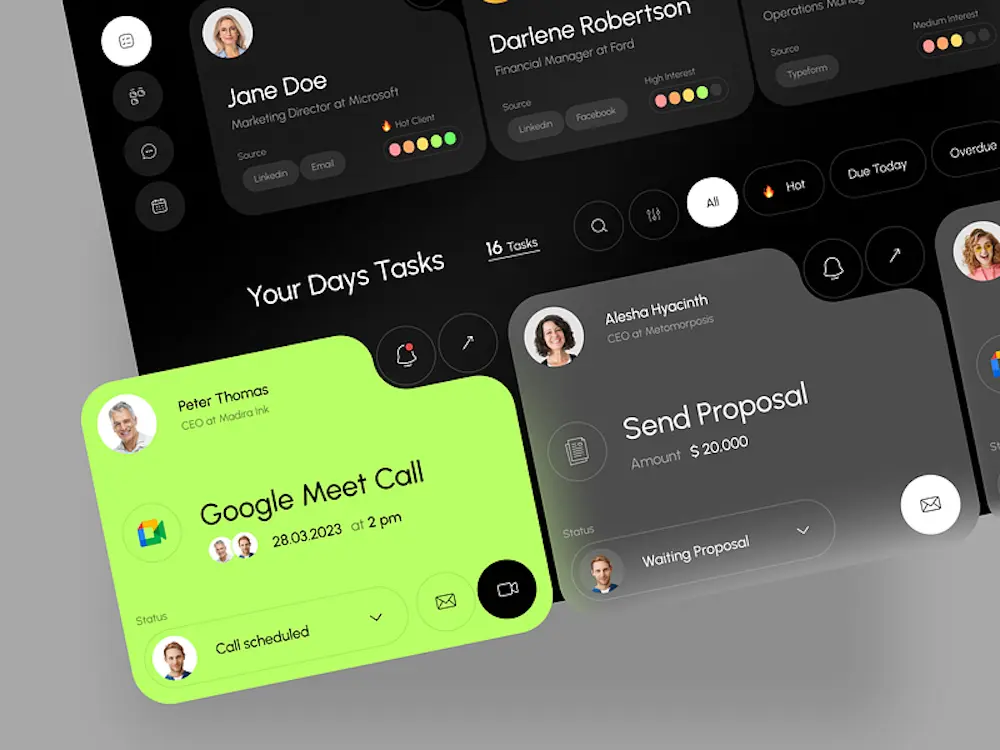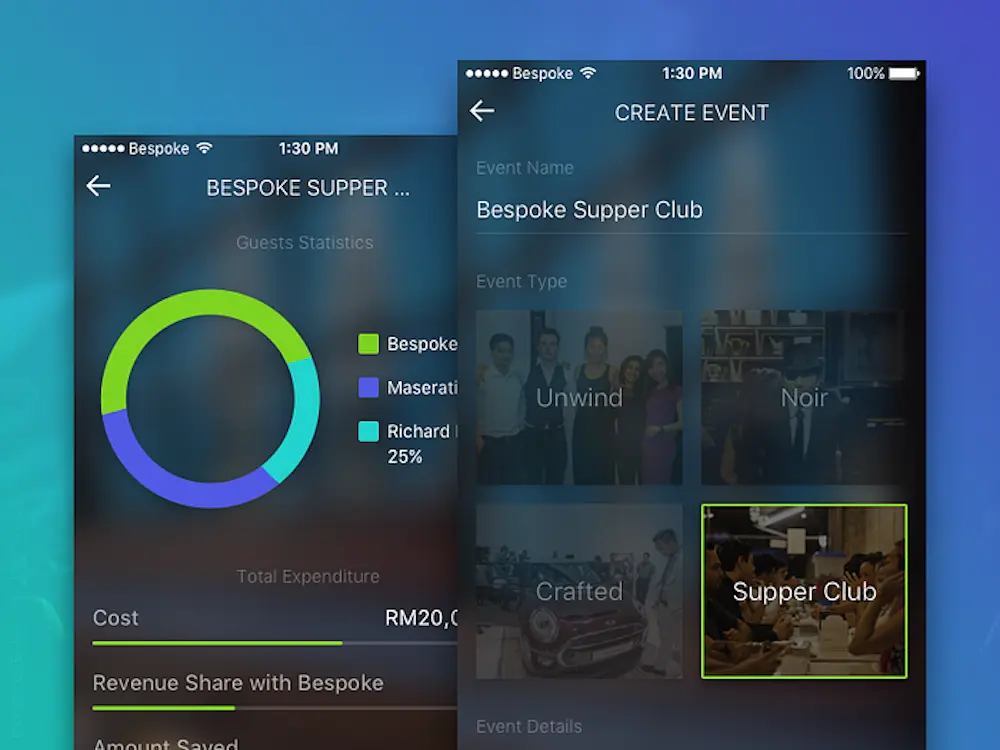What Is Bespoke Software Solution? Benefits, Use Cases, Differences vs Ready Made Solutions
In today’s digital age, software solutions have become an integral part of running successful businesses. With the rapid evolution of technology, businesses must leverage the right tools and partner with trusted software development company to stay competitive. Software solutions not only streamline operations, but they also improve productivity, and provide valuable analytics that drive informed decision-making. Bespoke software solutions, in particular, have gained significant traction in recent years. These customized solutions cater specifically to the unique needs of a business, offering a level of efficiency and effectiveness that generic software often cannot match. In the following sections, we will delve into the concept of bespoke software solutions, explore their benefits, and compare them to off-the-shelf options.
- According to a report by EY, 87% of business leaders view technology and digital transformation as their top priority. This underscores the important role software solutions play in modern business operations.
- For instance, a study by McKinsey found that businesses that adopt bespoke software solutions can expect a 27% improvement in performance over their competitors.
1. What Is Bespoke Software Solution?
Bespoke software solutions are custom-made software designed to cater to the specific needs of an organization. Unlike generic software, bespoke software is tailored to fit the unique requirements of a business, making it a perfect fit for the tasks it’s designed to perform.
For example, consider a bespoke software solution for a hospital. This software might include features such as:
-
Patient Record Management: Custom modules could be created to store, manage, and retrieve patient data efficiently. For instance, Epic Systems provides a bespoke solution for healthcare providers to manage patient records.
-
Appointment Scheduling: The software could have a system that allows easy scheduling of patient appointments, with reminders and notifications to reduce no-shows. For example, Zocdoc is a platform that offers a customized experience for healthcare providers to schedule and manage appointments.
-
Billing: A bespoke billing system could be integrated into the software to automate charges, handle insurance claims, and manage payments. Companies like Kareo provide bespoke billing solutions for healthcare providers.
Each of these features would be customized to fit that hospital’s specific workflows and procedures, ensuring a seamless, efficient operation.
Get in touch with Savvycom for a free consultation. We’ll help you decide on next steps, explain how the development process is organized, and provide you with a free project estimate.
2. The Process of Creating Bespoke Software Solutions
The journey of bespoke software development service is a detailed and multi-stage process. Each stage is essential to develop a software solution that ideally suits the specific needs of a business.
-
Initial Consultation and Needs Assessment: This is the first step, where software developers engage in detailed discussions with the organization. The goal is to understand the organization’s needs, goals, and the challenges they face with their current systems. This stage provides the foundation for the bespoke software solution.
-
Design: Based on the needs assessment, the software developers design the architecture of the software solution. This includes outlining the user interface, databases, integrations, and other technical aspects. The design phase sets the blueprint for the bespoke software.
-
Development: Once the design is approved, the actual coding and development of the software begins. Software developers translate the design into a functioning software, creating the features and functionalities outlined in the design phase.
-
Testing: After the software is developed, it undergoes rigorous testing for performance, compatibility, usability, and security. This step is vital to ensure that the software works as intended and is free from bugs and security vulnerabilities.
-
Deployment: Once the software passes all tests, it is deployed within the organization’s infrastructure. This could involve installing the software on the organization’s servers or providing access to the software through the cloud.
-
Training and Onboarding: To ensure the successful adoption of the software, the bespoke software company often provides training and onboarding to the organization’s staff. This helps users understand how to use the software effectively.
-
Ongoing Support and Maintenance: After the deployment, the bespoke software company typically provides ongoing support and maintenance. This includes regular updates, bug fixes, and security patches. It may also involve further customization and enhancements based on the organization’s evolving needs.
3. Benefits of Bespoke Software Solutions
Bespoke applications offer a myriad of benefits to businesses. These advantages are a result of the high degree of customization, scalability, and integration capabilities that bespoke software solutions provide.
Here are some of the significant benefits:
3.1. Customization:
According to a study by Forrester, 84% of businesses saw a higher efficiency in their processes as a result of customized software solutions. And one of the most significant advantages of bespoke software is that it’s designed to meet the specific needs of a business. Unlike off-the-shelf software, which is designed to cater to a broad market, bespoke software is tailored to the unique requirements of your business. This high degree of customization ensures that the software perfectly fits your business operations and workflows.
3.2. Scalability:
As per Gartner’s report, companies are increasingly investing in scalable solutions, with IT spending expected to reach nearly $3.8 trillion in 2023. Bespoke software solutions are designed with your business’s future in mind. As your business grows and evolves, your software can be adjusted to accommodate these changes. This scalability ensures that your software remains effective and efficient, even as your business needs change.
3.3. Integration:
A report by MuleSoft found that organizations are only integrating 29% of their applications, leading to disconnected experiences and missed opportunities. Bespoke software solutions can be designed to integrate seamlessly with your existing systems. This ensures a smooth work environment and can significantly improve operational efficiency. Whether it’s integrating with your current CRM, accounting software, or email system, bespoke software can bring all your systems together.
3.4. Security:
With cyber threats becoming increasingly sophisticated, security is a top concern for businesses. Bespoke software can be built with enhanced security features tailored to the specific risks and vulnerabilities your business may face. This level of customized security is often not possible with off-the-shelf software.
3.5. Cost-Effectiveness:
While the initial investment for bespoke software can be higher than off-the-shelf solutions, the long-term benefits often outweigh the initial costs. Bespoke software doesn’t require the frequent upgrades or replacements that off-the-shelf software often does. Moreover, it can reduce the need for extensive modifications or workarounds that can be costly and time-consuming.
3.6. Competitive Advantage:
According to a PWC report, 63% of high-performing businesses use software to differentiate their companies from competitors. Bespoke software can give businesses a competitive edge. By having software that is specifically designed for your operations, you can streamline processes, improve customer service, and leverage data in ways that off-the-shelf software might not be able to.
4. Bespoke Software Solutions vs Off-The-Shelf Solutions
When it comes to choosing software solutions for a business, the decision often comes down to bespoke software solutions versus off-the-shelf software. Both types of software have their advantages and disadvantages, and the choice largely depends on an organization’s specific needs, budget, and long-term goals.
| Factor | Bespoke Software Solutions | Off-The-Shelf Software |
|---|---|---|
| Customization | Offers a high degree of customization tailored to specific business needs and workflows. | Offers limited customization options, which may not fully align with specific business processes. |
| Scalability | Designed to evolve with the business, accommodating changes and growth over time. | May have limitations in terms of scalability, which could pose challenges as the business grows. |
| Integration | Can be designed to integrate seamlessly with other systems within the business, improving workflows. | May have integration limitations with other systems, potentially leading to inefficiencies. |
| Ease of Implementation | May take longer to implement due to the development process, but fits perfectly with business workflows. | Can be quicker to implement since it’s already developed, but may not perfectly fit with business processes. |
| Cost | Typically has a higher upfront cost due to the development process, but can lead to long-term cost savings. | Often has a lower upfront cost, but may have ongoing costs for licenses, updates, and potential customization. |
| Suitability | Ideal for businesses with unique needs and long-term growth plans. | More suited for smaller businesses with standard processes or startups looking for quick, inexpensive solutions. |
5. Case Studies of Successful Bespoke Software Implementations
Developing bespoke software solutions has proven pivotal in propelling the success of numerous businesses spanning different industries. Here are some real-world examples of successful bespoke software implementations:
-
Healthcare – Mayo Clinic: Mayo Clinic, one of the largest and most respected medical centers in the world, implemented a bespoke software solution to streamline its patient management system. The software, named Synthesis, was designed to consolidate patient information into a singular, easily accessible platform. This resulted in a significant reduction in administrative errors, improved patient care, and enhanced decision-making processes.
-
Manufacturing – Toyota: Toyota implemented a bespoke software solution known as the Toyota Production System (TPS). This innovative system was custom-built to automate and streamline production processes. The TPS led to increased efficiency, cost savings, and helped Toyota to become a world leader in lean manufacturing.
-
Retail – Amazon: Amazon developed a bespoke software solution for their warehousing operations, known as the Amazon Fulfillment Technology. This software automates and optimizes the inventory management, packing, and delivery processes in Amazon’s fulfillment centers, contributing significantly to their ability to deliver packages quickly and efficiently.
-
Finance – Goldman Sachs: Goldman Sachs launched a bespoke software platform named Marcus, which was designed to cater to retail customers, a new venture for the bank traditionally focused on institutional clients. The software was tailored to provide a seamless digital banking experience, helping Goldman Sachs to successfully enter the retail banking market.
What Is An Example Of Bespoke Development?
Examples of Bespoke software include platforms like Amazon.com and eBay. Instead of relying on off-the-shelf e-commerce templates to sell various products, these giants have invested in creating their own customized e-commerce platforms. These bespoke solutions uniquely connect buyers and sellers, distinguishing them from conventional, pre-made templates.
What Are The 7 Process In Bespoke Software Development?
Bespoke software undergoes a meticulous development process. This typically involves:
- Initial Requirements Gathering: Identifying and documenting the client's needs and objectives for the software.
- Requirement Analysis and Planning: Thoroughly examining the gathered requirements and devising a plan for the software development process.
- Technical Design: Creating a detailed blueprint that outlines the architecture, functionality, and technical specifications of the software.
- Development: The actual coding and construction of the software based on the previously defined design and specifications.
- Testing: Rigorous testing of the software to identify and rectify any bugs, issues, or discrepancies.
- Deployment: Implementing the software into the operational environment for use by end-users.
- Maintenance: Ongoing support, updates, and enhancements to ensure the software's continued functionality and relevance over time.
This comprehensive process ensures that bespoke software is tailored to meet the specific needs of the client while adhering to high standards of quality and performance
How Much Does Bespoke Software Cost?
Bespoke software development cost exhibit significant variability, influenced by factors such as project complexity, company size, and specific requirements. Cost ranges can be outlined as follows:
- Small businesses typically invest between £25,000 and £120,000
- Large enterprises may incur costs ranging from £80,000 to £500,000 or more
- Startups looking for MVP/POC development may budget between £5,000 and £30,000.
It's important to note that common misconceptions can lead to skewed perceptions of bespoke software costs. Selecting the right development partner involves a thorough assessment of their expertise, approach, communication skills, scalability, and cultural fit with the client's vision and values.
Is Bespoke Software Development Expensive?
Bespoke software development is ideal for businesses seeking a customized solution that aligns precisely with their unique requirements, offering a distinct competitive edge.
However, this tailored approach often comes with higher costs, increased time commitments, and ongoing maintenance needs. For an average bespoke web or mobile application featuring multiple users and complex workflows, the estimated cost typically falls within the range of £50,000 to £250,000, equivalent to $66,000 to $330,000 US.
Does Savvycom Provide Dedicated Development Team?
A dedicated development team is a model where an outsourcing company provides a team that works exclusively on your project. They act as an extension of your in-house team. Benefits of this model include:
- Focus: The team is entirely dedicated to your project.
- Flexibility: It's easier to manage changes in project requirements.
- Cost Efficiency: You get a full team without the overhead of hiring in-house.
Looking for a top-notch dedicated development team? Savvycom offers excellent value, providing high-quality dedicated development teams at attractive prices.
What is a bespoke solution?
A "bespoke solution" refers to a custom-made or tailor-made solution that is specifically designed to meet the unique requirements and preferences of a client or a business. Unlike off-the-shelf products which have a general set of features intended for a wide audience, bespoke solutions are crafted to address specific challenges, objectives, or needs of an individual client.
What is a bespoke application
A bespoke application is a tailored software solution, crafted to address the distinct needs and specifications of a specific business or individual. This contrasts with off-the-shelf software, which is created for a broad audience with standard features. Bespoke applications are custom-built to align closely with the unique workflows, requirements, and user preferences of the client, offering a personalized software experience
From technology consultation and end-to-end product development to outsourcing IT services, Savvycom has been leveraging digital technologies since 2009 to drive business growth across various sectors. Whether you need high-quality software solutions, product development, or professional software development services, we have the expertise to fulfill your requirements.
Savvycom is right where you need. Contact us now for further consultation:
- Phone: +84 24 3202 9222
- Hotline: +84 352 287 866 (VN)
- Email: [email protected]





